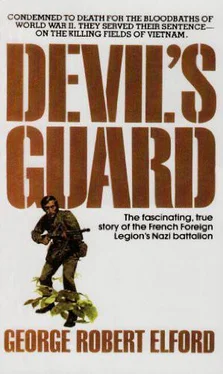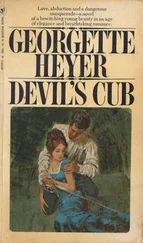If you keep your mouth shut, your death is going to be a long, endless cry of agony.”
Do you think he appreciated my offer? Like hell he did. He made me work all night, but when I was through with him he sang all the same. He sang like a nightingale, even though I was squeezing his bloody balls with a nutcracker. Then all of a sudden he broke free and came at me with a glowing steel rod which he grabbed from the fire. I had to shoot him in the head.”
Stahnke emptied his glass and looked around. “Boys, you had better get ready. Soon there’ll be plenty trouble here. The Legion Etrangere will need every German bastard—otherwise the world may wake up one morning to see the hammer and sickle flying from every damned pole from Hanoi to London and from Stockholm to Rome.”
Karl Stahnke was well informed both on the coming trouble and the Legion’s need for German bastards. In the summer of 1948, all former German troops were carefully screened (this time properly, with a bespectacled French captain quoting the various details of our real backgrounds, from a bulging pile of green, yellow, and red files) and interrogated again. One-time paratroopers, partisan hunters, Brandenburgers, field gendarmes, mountaineers, commandos, Wehrmacht, and SS, were all regrouped into a new battalion. The battalion consisted of about nine hundred men forming three companies. Its future existence or nonexistence was of little Importance to the French High Command. We became a sort of special task force which was to be given minimum support yet expected to accomplish the impossible. The North Africans nicknamed us “The Kamikaze Battalion” and the men would greet us with raised fists crying, “Banzaaai!” Colonel Houssong succeeded in concentrating us in a single fighting unit and even “recovered” some of our former ranks. More he could not do for us. For Paris and the French High Command we were the battalion of the damned. So we set out to earn their respect.
4. “THE CONVOY MUST GET THROUGH!”
Some North African and other mixed troops of the Foreign Legion were magnificent soldiers, incredibly brave in the attack and tenacious in the defense. What they lacked was proper food and medical care, ample ammunition, timely reinforcements; but most of all they lacked the knowledge of how to combat insurgents. They had been given comprehensive training in conventional combat strategy and tactics in the North African deserts and the barren, rocky mountains such as the Atlas. Then they had been sent to Indochina to wage an unconventional war in the jungles and swamps of a country that was totally alien to them. They had fought bravely and suffered fifty percent casualties. The survivors were regrouped, attacked again, and once more their ranks were decimated by the Viet Minh. They could man a fort or a distant stronghold purely on the defensive, but in the jungles the North African troops were useless. To them the impenetrable green sea of bamboo and lianas seemed utterly hostile, full of unexpected traps, tigers, scorpions, venomous snakes, diseases, and other invisible enemies—among them human enemies whom they could not see, let alone destroy.
With us it was different. We could and did adapt to our new environment and I enforced our new “rules of the game” with vigorous discipline. Being on the average far more intelligent, the former German veterans could put up with more misery yet suffer less than the other troops suffered. I have never regarded my men as only subordinates but as my veteran German comrades in peril. Officers and ranks had been calling each other by Christian names but our intimacy never jeopardized common discipline. When it came to military discipline the otherwise casual “Hello, Hans” or “Damn you, Karl” quickly turned into a “Jawohl, Herr Oberleutnant” or “Yes, sir!” We used to talk things over and my men understood the importance of keeping themselves clean, healthy, and fit for action. We boiled or purified our drinking water, even in the most adverse circumstances. When we could not do so, we suffered from thirst. Except for climbing steep mountains, one can always move on and make another step forward. The capabilities of a healthy human body are virtually unlimited. One can always go without water for two days even in a land of extreme humidity. In my battalion everyone duly consumed his daily ration of vitamin pills that more often than not we had to purchase from private pharmacists at our own expense. On the road our principal nourishment was rice, sometimes curried, sometimes only boiled, and dried fish, or whatever the jungle could provide. We had purchased large quantities of camphor and menthol creams from which excellent mosquito and leech repellents could be prepared. We had learned that in Russia. Every one of us carried a small mosquito net, good enough to cover one’s face and hands while resting in a swamp or near rice paddies after dark. In order to keep fit, sufficient rest was of paramount importance in Indochina. Men with swollen eyes and legs covered with festering sores, men devoid of sleep and tormented by belly cramps could not be expected to fight and defeat the Viet Minh. After the day’s march and no matter how worn they may have been, my men had to remove their boots, dry them if wet, clean them inside and outside, and grease the leather to keep the footwear watertight. Also all the weapons had to be cleaned and oiled every evening.
Sometime in 1948 or 1949 I got hold of a book written by a British officer named Spencer Chapman, who had spent several years in the jungles of Malaya leading local guerrillas against the Japanese. His book, The Jungle Is Neutral, I regarded as an alphabet on guerrilla warfare or, for all that, antiguerrilla warfare. For the benefit of my men I held regular daily seminars citing important information from Chapman’s book. We used many of the British officer’s ruses, such as booby traps hidden in hollow sections of bamboo, with outstanding results. From his descriptions we also learned much about the ideology and psychology of the Communist guerrillas. This gallant officer and former foe forged many “German” victories in Indochina and also saved the lives of many of my men. His book became a sort of Holy Writ on jungle war in my battalion, and in my opinion it was superior to Mao Tse-tung’s concepts, the Holy Writ of the Viet Minh. With a couple of field commanders like Spencer Chapman the Foreign Legion would have defeated the Viet Minh in a year.
All the same we also studied Mao’s writings on guerrilla warfare and managed to turn many of his ruses against his own Indochinese henchmen. Old Ho Chi Minh must have had a few sleepless nights because of our activities. We always paid off the guerrillas in kind: bomb for bomb, bullet for bullet, murder for murder.
They did not like it.
We defeated the Communists at their own game but never as regulars versus insurgents, rather as guerrillas against guerrillas. War against guerrillas in the jungle is not a war of airplanes and tanks. It is a war of wits.
We introduced ourselves to the Communist chief of staff, Nguyen Giap, in the North, near the Chinese frontier where one of his rugged battalions besieged a small French garrison thirty-two miles from Cao Bang. The garrison consisted of a stockade with blockhouses defended by about one hundred and twenty Legionnaires. The fort had been built by the Japanese, then modernized by the French to guard the road between Cao Bang and Bac Kan farther to the South.
The guerrillas, about six hundred strong, surrounded the stockade and kept it under constant fire from the neighboring woods and hills. The Viet Minh battalion commander, who learned his trade in Mao’s militia, decided to extort a quick victory before reinforcements could move in. He lined up forty French prisoners two hundred yards from the palisade, in plain sight of the fort, then sent a message that he was going to execute one prisoner every five minutes until the commander of the fort, a young” French lieutenant, decided to surrender. When the period of grace was over, the Viet Minh proceeded with the executions in a most horrible fashion, obviously with the aim of intimidating the garrison. They chopped off first the right then the left arm of the prisoners, broke their legs with iron bars and finally shot the men in the head one after another—at five-minute intervals.
Читать дальше












